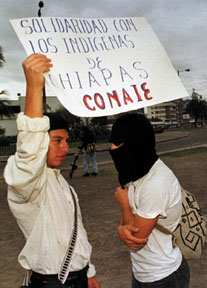|
After a failed uprising, Ecuador's indigenous groups warn a civil war could ensue.
By Steven Dudley
Quito, Ecuador
|
|
|
CONAIE,
Ecuador'sargest indigenous |
Just 18 hours after indigenous groups had briefly taken power and forced President Jamil Mahuad to step down, they were suddenly ready to leave Quito. Dressed in dark, thick sweaters and donning their trade mark brown suede hats, members of the Confederation of Indigenous Nationalities of Ecuador (CONAIE), the country's strongest indigenous organization, hastily finished off their potato soup and moved toward the awaiting buses. "They betrayed us," one man said. "And in our culture, when someone betrays you, you cut his head off."
Indigenous leaders, unions and popular organizations were the most vocal sectors calling for Mahuad's resignation in mid-January, but most Ecuadorans supported them. Just weeks prior to his downfall, the president's approval rating was a mere 7 percent, and the economic recession that precipitated the massive protests seemed destined to continue. Since the new year, the value of Ecuador's currency, the sucre, had slipped 25 percent, and the president's indecisive nature led few to believe that any decision he could make would garner support in the country's defiant Congress. In the weeks leading up to the coup, strikes increased and several top officials resigned in protest of government policy. The stage was set for what at first glance appeared to be a spontaneous uprising by indigenous groups, but quickly turned into an historic betrayal of the CONAIE and their supporters.
Steven Dudley is a journalist based in Bogota, Colombia.
![]()
|
In These Times ©
2000
Volume 24, Number 7 |

